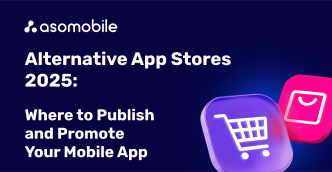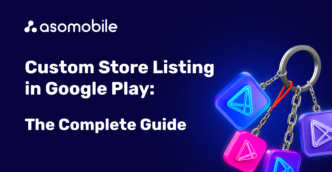How to pick up keywords for your app?
Keywords for your app are important and, let's not be afraid of tautology, a key point in achieving success!
At the end of the article, you can find a 40% discount coupon for the first month of using ASOMobile - a tool for creating ASO and researching competitors in the mobile app market.
You go to the app store and you are greeted with hundreds, thousands of bright icons, and eye-catching titles, and the store also accompanies you with its tips and tricks, what else you might like. Inspired, you create your own application which is unique and interesting. But approaching the release of your app on Google Play or the App Store, you stumble over the question - how should your users find your app, and by what queries will the store show applications in the search results? In other words, you are faced with textual ASO optimization of the application.

We will not let your application get lost among others, although the competition is more than impressive. There are currently 11,406,790 apps on Google Play and 4,435,582 on the App Store respectively. And the dynamics of the emergence of new applications are quite obvious (see infographic). Of course, the tightening of rules and policies regarding the publication of applications has slightly reduced this number, but also improved the quality of applications. You would like to add +1 to this counter, at the very least, wouldn't you?
Almost certainly we can say that if there is and exists some kind of task or need, then most likely there will be applications for it. But this is not a reason to give up, but just a reason to approach text optimization and the selection of keywords with the utmost seriousness.
Keywords - general terms and concepts
Let's understand a little about the terms and concepts of textual ASO app optimization. In order to perceive information regarding this topic easily, we recommend you to look into our ASO Dictionary.
A keyword (search query, key, keyword) is a word or phrase that characterizes an app or its main functions. Users type these words and queries in the search to find the application they are interested in. Developers are trying to embed them in metadata to improve the visibility of the application in search.
A keyword phrase is a combination of keywords that helps a developer promote their app to their target audience.
A semantic core is an array of keywords and phrases that describe the application best, with all relevant associations. ASO specialists embed this list of keywords into metadata to improve the visibility of the application in search (ASO optimization). By entering any of these keywords in the market bar, the user will be able to find an optimized app.
Well enough to finally start answering the question - how to find the keywords for your application and understand if they are correct?
The basic steps for finding keywords for your application.
The study of search queries can most likely be called the most important and time-consuming part of text optimization. Therefore, let's start with the deductive method, from general to specific
Step 1.
The very first source of keywords or search terms is you. Think about what tasks, problems, or needs exactly the user will solve using your application. You know everything about your product as a developer - take advantage of this!
It is possible to operate with the most general concepts already now, at the initial stage - application or game? If an app, what tasks does it solve - sports, personal development, finance, business? Is the game RPG, casual, puzzle, or space shooter?
Having answered these questions for yourself, you already form a certain pool of keywords that will be relevant to your application or game.
Step 2
Study your potential users. What will they look for, and most importantly, what will they find in response to search queries? Tips from app stores will help you with this - enter a relevant query into the search bar (we created it at the first stage) and you will receive a list of search queries that users have already entered and that the store considers similar to your query. The main thing to remember is web search on Google is not a very good helper, because it is mainly aimed at information requests, but searching in app stores is our option.
Step 3
Let's go directly to the search results of the app store - to competitors! Understanding who they are and why they are good is an essential part of your app optimization strategy. Competitors are not only a threat, they are also motivation and inspiration for you. By watching their success and learning from their failures, you will gain experience at the expense of others, in the most positive sense.
By sorting through already formed search queries, you will get various search results and create your own list of apps-competitors.
Step 4
Quantitative metrics are the most important indicator of the semantics you have collected. How many users per day enter the search query you are interested in, and how many competing applications are in your top semantics? Do not forget about advertising on the markets - the first few lines in the search results belong to applications that use paid advertising for promotion. It is at this point that we consider it necessary to mention the existence of services for selecting application keywords that contain all the information you are interested in. You can find a list of popular ASO tools for text and visual optimization here. But in more detail, we will focus on the ASOMobile mobile analytics tools.
How to pick up keywords for the app?
Let's talk about two points - if the application is under development, then the collection of the semantic core for text optimization takes place on the nearest competitor application with a similar set of functions, or you can take the opportunity and add all the applications you are interested in to the competitor's section and use search queries, by which they are indexed.
Keyword Monitor and Semantic Core
The first tool we will use will be Keyword Monitor - a place where you will collect, analyze and structure the semantic core of your application.

Using the Auto Suggestions by the system, we can form an initial pool of search queries. This is very convenient, especially when it comes to optimizing an application in a language you do not know, or if you have no idea where to start. The system will suggest relevant key queries with traffic and automatically add them to your semantic core.

By way of auto-suggestions, we already have 30 queries that we can continue to work with. Namely, look at the search results for each key request and add the competing applications that you are interested in.

For each keyword you have accompanying information, pay special attention to the Traffic metrics and the suggestion icon.

If the traffic shows you the estimated number of users who search for this search query per day, in the specified country. But you can use the suggestion as an additional source of keywords for your semantic core.

This is what a keyword suggestion looks like, indicating traffic and the ability to add it to an already formed pool of keywords.
App Keywords and app indexing
The next step in finding search queries is App Keywords, a tool that will show you the indexing of the selected application by keywords.

This way, you can enrich your semantic core with a lot of search queries with traffic and a guarantee of relevancy (don't forget to check the search results for the key, this is also possible here).
In the competitor's tab, you have the opportunity to visualize the indexing of competing applications by keywords, thereby confirming the need to add them to the semantic core.

Store Suggestions are an important and, actually, completely accurate way to discover even more keywords for your app. In the suggestion tab, you will be offered Google Play suggestions (since we are working with the application specifically for this store) for each of the keywords that are added to Keyword Monitor.
And in the Related tab, you will find keywords that match in subject matter and meaning with queries that are in Keyword Monitor. This way, even more, key queries can be added to the semantic pool.
Keyword Finder and the most popular queries for your application.

Since Keyword Finder works based on the analysis of application metadata, and keywords of the competitors, it will offer suggestions and similar search queries. The selection method is completely different from App Keywords, so here you can find even more keywords for your app.
Keyword Select and Keyword Suggest
These two tools are designed to expand your semantic core. Keyword Select - will show you similar search terms to the ones you have already collected. And Keyword Suggests will work to search for suggestions for the specified word, but with a larger field for selection.

Text Analyzer - SEO for ASO
This tool offers a wide range of opportunities for working with text and its SEO analysis. But Text Analyzer can also be useful when collecting the semantic core of the application.

It works with the text of the application description (you can and should also analyze the description of competing applications), analyzing the frequency of use of keywords, and highlighting search queries from the text that can be added to your list of keywords.
Semantic core of the app
The collected pool of search queries and keywords you need to prepare to use in the application metadata:
- clear the core of irrelevant and branded queries (they will only distract the user's attention and take up space in the app metadata).
- sort keywords by traffic, thereby identifying high-frequency, mid-frequency, and low-frequency search queries.
In the future, using Keyword Monitor, you can track the indexing of your application for selected keywords. So you will refer to this tool in the future.

That is why we recommend using all the filters and labels that are available for working with the keywords of the semantic core of your application - color filters to indicate frequency, and mark selected keywords. All this will give you the opportunity to easily analyze the results in the future and, if necessary, correct the semantic core of the application.
Are the right keywords the key to success?
Of course not, but a well-built core with the correct use of keywords in the app metadata will create a solid foundation and allow your other efforts to promote the application to be more effective.
Keyword research is one of the foundations of ASO text-based app optimization. Only if you embed the right keywords into your app's page on the store will you ensure your app visibility in the SERPs and a source of organic traffic.
The subsequent implementation of keywords in application metadata is detailed in the following blog articles:
- ASO APP OPTIMIZATION: BASIC CONCEPTS, TERMS, AND STAGES
- ASO APPLICATION OPTIMIZATION: STEP BY STEP INSTRUCTIONS
- FIELD KEYWORDS FOR IOS: HOW TO CHOOSE KEYWORDS FOR YOUR APP
 Українська
Українська  Русский
Русский  Español
Español 






